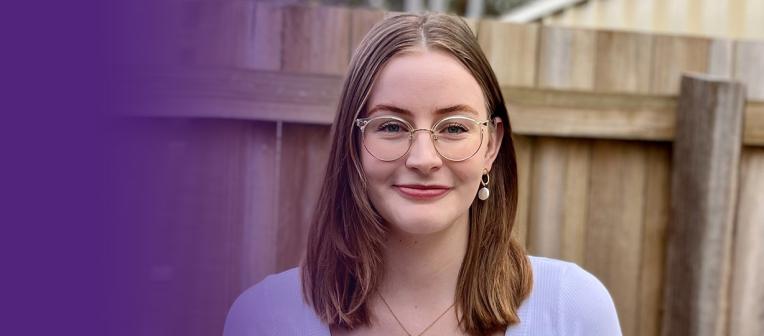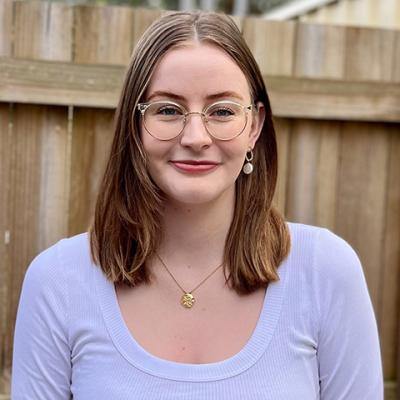Bachelor of Speech Pathology (Honours) fourth year student Laura Page shares her experiences from her degree and why she decided to study speech pathology at The University of Queensland.
What are you studying and what year are you in?
I am studying a Bachelor of Speech Pathology (Honours) and I am in my fourth and final year.
What drew you to studying speech pathology?
I’ve always been interested in how people communicate and how language works. I gravitated much more towards English than Maths in school, but I also loved Biology and learning about anatomy and physiology. I remember my mum, a nurse, coming home one day while I was in Year 10 after having worked with a speech pathologist, and she said she could see me in that job. After reading into it, it just felt like the right fit – and my passion for the profession has grown ever since!
Why did you choose UQ to study speech pathology?
UQ is renowned for having one of the best speech pathology programs in Australia, and it has absolutely lived up to this reputation in my experience. Being able to learn from people who are experts in their field and highly regarded in the speech pathology community has been a privilege. UQ also offers a range of practical, clinical experiences that have been key to my learning.
What type of person enjoys studying speech pathology?
I’d be lying if I said there didn’t tend to be a certain personality type who goes into speech pathology! Speech pathology students tend to be problem-solvers and a tad perfectionistic; however, they are also some of the warmest, most compassionate, most hard-working people I have met. If you have a drive to connect with people and empower them to live the life they want to live, you will thrive in this profession.
I think it’s also important to recognise here that it has historically been, and continues to be, a largely white, able-bodied, female-dominated profession. We’re starting to see more diversity in the profession, which is wonderful, but we still have a way to go in making sure our profession is representative of the communities we serve.
What does a day in the life of a speech pathology student look like?
I find that every single one of my days is different and very much depends on the time of semester and the semester itself. For example, there may be semesters where I am on placement for 6 weeks in the latter half, so the first half is very content heavy and I am spending more time on campus. However, this semester, for example, I have one day of placement for 8 weeks and the other days I’m either attending tutorials or lectures, studying from home, or working one of my part-time jobs.
How hard is studying speech pathology?
The first year of the program is very foundational, and I found that the transition to university from school was harder than the content itself. The second and third years of the program tend to be very content heavy, and you’re thrown lots of information at once. However, once you start to see the practical application of this information in third and fourth year during clinical placements, the parts of the puzzle start to come together.
It can absolutely be hard, but I would say the good days outweigh the hard days. It’s easy to get bogged down in the day-to-day of studying, but when you get to explain what you do to someone, or you see a client make meaningful progress, you realise how cool this profession is!
What are the most challenging aspects of studying speech pathology? How do you overcome these challenges/difficulties?
This is such a personal question, and every person will answer it completely differently. For me personally, the hardest aspect has been balancing all things uni, work and life and wearing lots of different hats. I also think it’s quite common to experience self-doubt and imposter syndrome, and that’s certainly been a part of my experience. However, one of my clinical educators told me something that will always stick with me, and it’s that you may not always feel confident, but you can know that you are competent.
Surrounding yourself with people who lift you up and fill your cup is also important. One of the things I’ve really appreciated about the speech pathology program at UQ is how close-knit your cohort ends up being, and your peers end up being a massive support.
Have the challenges been worth it?
Absolutely! It is really empowering learning all this content and then being able to apply it on placement and see how patients progress and improve. I have learnt so much about myself, and you gain amazing friendships with your peers who make all the hard days a lot more manageable.
What do you love about studying speech pathology?
I love how broad this profession is. Communication affects every single thing we do, and it’s only when it’s impacted or changed that you realise how much we take it for granted. Many people know speech pathologists work with the communication side of things, but less people realise that we also support people with swallowing and feeding difficulties. When you think about it, it makes a lot of sense given we use the same muscles for talking and eating. People may present with dysphagia (i.e. difficulty swallowing) following a stroke or acquired brain injury, but it can also present in people with respiratory conditions. It is also great that we work all across the life span from little bubs to people at the end of their life.
How have you found studying in an interprofessional environment with students from different allied health disciplines?
I’ve found the peer learning aspect of placements super valuable, because it gives you a more holistic picture of your client or patient. I’ve found that many students from different disciplines are very open to learning more about speech pathology, and there are often opportunities to advocate for your clients/patients by providing communication strategies to the multidisciplinary team. This means better outcomes for clients/patients!
What are the most valuable skills you’ve learnt while studying speech pathology?
The most valuable skills I’ve learnt are how to be a truly empathetic listener, getting comfortable with silence, and learning how to navigate hard conversations with care.
What type of career paths/specialisations are typical of speech pathology graduates?
Speech pathology as a profession is very broad as we work across the lifespan in many different areas with many different communication and swallowing disorders. A publication from Health Workforce Australia in 2014 demonstrated that just over half of speech pathologists work in private practice only, while about 36% work in public practice (e.g. in hospitals, schools) and about 10% work across both settings. With the introduction of the National Disability Insurance Scheme, we’ve seen demand for speech pathology services rapidly increase and many more speech pathologists are going into private practice or organisations that specifically work within the NDIS.
Another exciting emerging area of speech pathology that many people probably wouldn’t realise is even a possibility is that of justice, especially youth justice. It is estimated that 75% of youth in custody have language skills below those expected for their age and approximately 50% have severe communication difficulties. Communication difficulties can make it difficult to navigate an already complicated judicial system, so the need for speech pathologists in the justice workforce is clear.
What advice would you give to someone who wants to study speech pathology?
First of all, you’ve made an excellent choice – this is a profession with so much to give! The biggest piece of advice I would give is to be open to any opportunity that comes your way, and also be open-minded when it comes to different opinions or perspectives. Studying speech pathology can be hard and challenge you to step out of your comfort zone, but this is really where the learning happens. If you’re not sure about something, just give it a go!
Do you have aspirations for where you want your career in speech pathology to go?
I feel like I’ve been asked this question lots recently as I get closer to graduation! At the moment, I’m still a bit unsure where I want my career to go. I have a passion for inclusive education and supporting students to access the curriculum at school, as well as supporting people who use Alternative and Augmentative Communication (AAC). However, I really enjoyed my adult acute placement also and I want to keep up my skills in that area.
Find out more about UQ's Bachelor of Speech Pathology (Honours)






